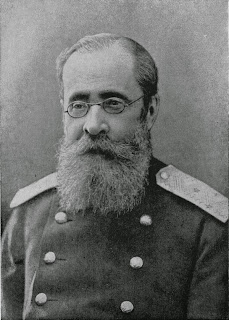Information
Composer: César Cui
- A Feast in Time of Plague, opera in one act
- 3 Scherzos, Op. 82: No. 1 in C major
- 3 Scherzos, Op. 82: No. 2 in F major
- 3 Scherzos, Op. 82: No. 3 in C minor
- Les deux ménétriers, Op. 42
- Fair Spring, Op. 66 No. 4
- Budrys and His Sons, Op. 98
Andrei Baturkin, baritone (1, 7)
Alexei Martinov, tenor (1)
Dmitri Stepanovich, bass (1)
Ludmila Kuznetsova, mezzo-soprano (1, 6)
Tatiana Sharova, soprano (1, 5)
Russian State Symphony Orchestra
Valery Polyansky, conductor
Date: 1999
Label: Chandos
https://www.chandos.net/products/catalogue/CHAN%2010201
----------------------------------------------------------------------------
Review
Pleasing account of a haunting little Russian opera that deserves a better fate
Pushkin’s ‘Little Tragedies’ have been a fruitful source for little operas, embodying as they do what Philip Taylor calls in his excellent booklet-note, ‘a psychological portrait of a character facing a critical moment in his life’. They also present such a moment for our observation without passing judgement, something that is harder when music is involved. Each opera in its way is remarkable. Dargomyzhsky’s The Stone Guest, a classic of musical realism, shows us Don Juan confronting his fate through three women. In Rimsky-Korsakov’s Mozart and Salieri, capricious genius falls victim to pedantic talent. Rachmaninov’s Miserly Knight forces us to consider the nature of avarice and loyalty. And in the least known of them, each of the revellers sat at the table in Cui’s A Feast in Time of Plague must find an individual response to the approach of death.
John Wilson’s original play is, according to John Bayley’s classic study Pushkin (CUP: 1971), ‘a dramatic fragment…padded out to inordinate length’, and Pushkin’s genius lay in seeing how one of his succinct dramas could be made by concentrating on three of the characters. Cui, in his turn, saw that an answer lay in varying musical treatment for the three within a general idiom that is close to Dargomyzhsky or Mussorgsky in its speech-inflected melody. Walsingham, the chairman of the feast, confronts death with a fine bravado, especially in Andrei Baturkin’s vigorous declamation of Cui’s assertive dotted-note phrases. Mary responds with gentle resignation in what Walsingham calls a plaintive song, affectingly sung here by Ludmila Kuznetsova. The words recall her native Scotland, but the melodic line, and the metrical fluency, are entirely Russian. Thirdly comes the Priest, and Dmitri Stepanovich gravely intones his admonition to the revellers to abandon their feast and contemplate their end in prayer. Smaller contributions come from two other revellers, Louisa and the Young Man. There is no conclusion. The feast continues.
Valéry Polyansky conducts an eloquent account of this odd, rather haunting work. Cui was a narrowly conservative figure, as is shown in his deplorable book La Musique en Russie, but he was a talented one, and the opera is more striking than its neglect suggests.
The Scherzos recorded here are unremarkable, and the ballad Fair Spring rambles, though Kuznetsova does her best with it. But Budrys and his Sons is quite an amusing piece, a Pushkin translation of a ballad by Poland’s national poet Adam Mickiewicz. Budrys dispatches his three sons to win glory and wealth, and all each of them does is return with a pretty Polish bride. Clearly this ballad had an appeal for the part-Lithuanian Cui, though he chose to set it in a free adaptation of Glinka’s essentially Russian changing background technique (as employed, for instance, in the Finn’s ballad in Ruslan and Lyudmila). It is fluently done, with some entertaining orchestral invention which Polyansky and the players handle colourfully.
-- John Warrack, Gramophone
More reviews:
http://www.classical-music.com/review/cui-0
http://www.theguardian.com/music/2004/may/28/classicalmusicandopera.shopping5
http://www.operatoday.com/content/2005/02/cui_a_feast_in_.php
http://www.amazon.com/Feast-Time-Plague-C-Cui/dp/B00022M478
----------------------------------------------------------------------------
César Cui (18 January [O.S. 6 January] 1835 – 13 March 1918) was a Russian composer and music critic of French and Lithuanian descent. He was a member of group "The Five", although Cui's works are not so nationalistic as those of the other members. As a writer on music, Cui contributed almost 800 articles between 1864 and 1918 to various newspapers and other publications in Russia and Europe. As an officer of the Imperial Russian Army he rose to the rank of Engineer-General (compared to full General), taught fortifications in Russian military academies and wrote a number of monographs on the subject.
***
Valery Polyansky (born 19 April, 1949 in Moscow) is a Russian orchestral and choral conductor. Polyansky studied at the Moscow Conservatory, where his teachers included Boris Kulikov and Odisei Dimtriadi. Since 1992 he has been a chief conductor and artistic director of the State Symphony Capella of Russia which consists of a symphonic orchestra and a choir, numbering more than 200 artists. Polyansky is recognized today as a leading interpreter of the works of Sergei Rachmaninov and a number of other neglected Russian composers such as Alfred Schnittke, Sergei Taneyev and Nikolai Miaskovsky.
----------------------------------------------------------------------------
FLAC, tracks
Links in comment
Enjoy!



This comment has been removed by the author.
ReplyDeleteChoose one link, copy it to your browser's address bar, wait 5 seconds, then click on 'Skip Ad' (or 'Continue') (top right).
ReplyDeleteIf you are asked to download anything, IGNORE, only download from file hosting site (mega.nz).
If you MEGA shows 'Bandwidth Limit Exceeded' message, try to create a free account.
http://evassmat.com/BjEd
or
https://ouo.io/1jedHw
or
http://uii.io/UtacC